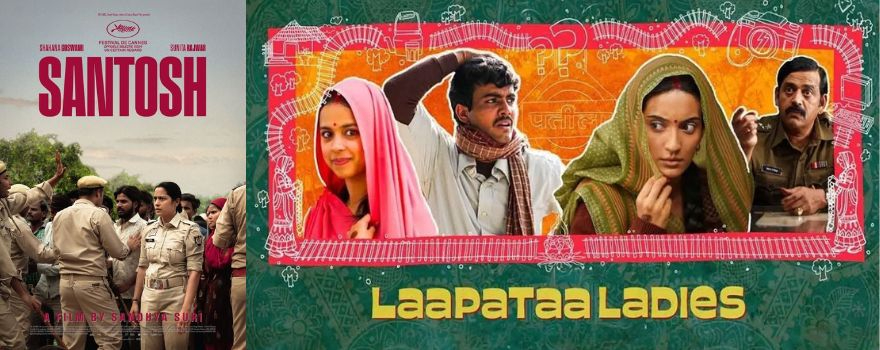Feminist Narratives Put Indian Cinema on the World Stage in 2024
03 JAN 2025
In 2024, while Bollywood grappled with challenges, Indian women filmmakers gained prominence with smaller, nuanced films that captured attention both nationally and globally

In May, Indian filmmaker Payal Kapadia's All We Imagine As Light made history by winning the Grand Prix at the Cannes Film Festival.
Since then, the film has become a powerhouse in indie cinema, dominating film festivals and the awards circuit. It has been named Best International Film by esteemed organizations such as the New York Film Critics Circle and the Toronto Film Critics Association. Additionally, it has garnered two Golden Globe nominations, including one for Ms. Kapadia as Best Director.
The film has also earned spots on several "Best Films of the Year" lists, including those by the BBC and The New York Times. And it's not standing alone.
Director Shuchi Talati's coming-of-age drama Girls Will Be Girls grabbed two awards at the Sundance Film Festival, while Kiran Rao's Laapataa Ladies (Lost Ladies) stayed on Netflix India's top 10 list for over two months. It was even chosen as India's official Oscar entry—a decision that stirred up some controversy. Though Laapataa Ladies didn't make it to the Academy's shortlist, British-Indian director Sandhya Suri's Hindi film Santosh, submitted as the UK's entry, managed to secure a spot.
Film critic Shubhra Gupta believes the recent success of Indian films is both a culmination of long-standing efforts and a timely shift in global consciousness. "These films weren’t made overnight," she emphasizes, pointing out that Girls Will Be Girls director Shuchi Talati and co-producer Richa Chadha first conceived the idea during their college years and have been refining it for years. Gupta describes it as "pure serendipity" that 2024 became the year these films sparked widespread conversations and recognition simultaneously.
Take All We Imagine As Light, for example—a multilingual film in Hindi, Marathi, and Malayalam. It follows three migrant women in Mumbai as they navigate empathy, resilience, and human connection. The story touches on loneliness and the broader socio-political climate, including the complexities of interfaith relationships, as seen in the bond between Anu (Divya Prabha) and Shiaz (Hridhu Haroon).
Shuchi Talati's coming-of-age drama Girls Will Be Girls snagged two awards at the Sundance Film Festival, marking a high point in what feels like a cinematic dream year. The global buzz around these films comes down to their quality and the way they tackle universal themes like loneliness, relationships, identity, gender, and resilience. With bold female perspectives and fresh feminist narratives, they explore areas often overlooked by mainstream Indian cinema.


Kayal Kapadia told the BBC that while the women in her films are financially independent, their personal lives, especially when it comes to love, are still shaped by societal restrictions. "Love in India is very political," she explained. "Women are often seen as carriers of family honor and protectors of caste lineage. So, if a woman marries outside her religion or caste, it becomes a big issue. It's really just a way to control and infantilize women."
Meanwhile, Shuchi Talati’s Girls Will Be Girls dives into female adolescence, rebellion, and generational conflict. Set in a strict Himalayan boarding school, the film follows a 16-year-old girl grappling with her identity and her fraught relationship with her mother, Anila, who is navigating her own emotional struggles.
Film critic Shubhra Gupta points out how rare this kind of storytelling is in Indian cinema. “It’s a coming-of-age film we never really see here. It portrays women with empathy and warmth,” she says. Gupta also highlights the unique perspective of the film. “It explores that age when people feel emotions with and without their minds and bodies, without making it seem childish—something mainstream Indian cinema hasn’t done before.”
Kiran Rao’s Laapataa Ladies may not have set the box office on fire, but it received warm praise from critics and audiences alike. At a BAFTA screening in London this month, Rao called this period "a truly special moment for women from India" and shared her hope that more such stories will continue to emerge.
The film is a satirical comedy about two newlywed brides who accidentally switch places on a train due to their veils. Beyond the humor, it delivers a sharp critique of patriarchy, identity, and gender roles, marking a significant departure from the traditionally male-focused narratives of mainstream Indian cinema.
Bollywood star and co-producer Aamir Khan reflected on the film’s themes, saying, "Many of us hold patriarchal beliefs simply because it’s how we were raised. But it’s important to be open, to try and support each other in moving beyond this mindset."
One of the most unexpected highlights of the year came from the UK, which chose Sandhya Suri’s Hindi film Santosh as its official Oscar contender. Filmed entirely in India over 44 days with a largely female crew, the thriller stars Shahana Goswami and Sunita Rajbhar. With co-producers from the UK, India, Germany, and France, the film takes on the topic of violence against women, offering a distinctly Indian narrative with a universal message.
Goswami feels that the success of Santosh and All We Imagine as Light reflects a shift in global cinema, where boundaries are blurring and industries are expanding. "Indian films don’t need a specific cultural context to resonate. Emotional storytelling speaks to people everywhere," she shared with the BBC. She also thinks cross-border collaborations will be key moving forward, pointing out how a partnership with a French producer can help a film reach broader audiences.
Bollywood also saw strong performances from women-led films this year. Stree 2, a horror-comedy about a monster that kidnaps independent women, became one of the top hits at the box office. On the streaming side, Sanjay Leela Bhansali’s opulent Heeramandi: The Diamond Bazaar on Netflix, which delves into the lives of courtesans in pre-independent India, ranked among Google’s most searched TV shows of the year.
These successes underscore the growing demand for fresh, diverse stories that mix important themes with entertainment. Despite the challenges, 2024 has highlighted the rising influence of Indian women in film, offering a promising outlook for the wider distribution of indie films and a more diverse, inclusive industry.





















